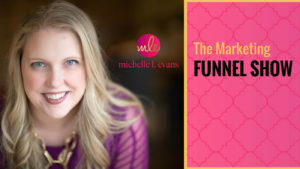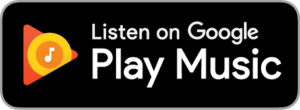
Episode 79: Mastering Your Service Business with Maggie Patterson
Today on the podcast, I’m thrilled to introduce you to one of my secret weapons: Maggie Patterson. Maggie and I have known each other for years, and last year I rehired her and her team to write my weekly show notes, emails, and social media updates.
Best money I have EVER spent in my business.
I’ve also hired her team to help me with funnel content, sales pages and more. They are so good at what they do and so talented.
Part of the reason I wanted to have Maggie on was that I hear from people all the time who don’t think a service business is a “real” business. That somehow they’re failing because they don’t have “passive income” or a million dollar course.
Well, Maggie is about to pull the curtain back on that one and share why — even though she has programs and services that bring in a big income each year — she’s still committed to running a service business.
Maggie is a fab combo of someone who is a true professional, who has seen and done all the things out there, and who is now super confident and comfortable with the businesses she runs.
Let’s jump into the interview!
 Biggest Show Takeaways:
Biggest Show Takeaways:
- How long have you been in business, what are your businesses, and what is it that you focus on?
- I started my business 14 years ago. I basically left a very lucrative, very comfortable PR agency director job that I actually really, really loved but wasn’t going to be the right fit for me moving ahead. I wanted to go out on my own. I went on maternity leave and never came back.
- I've gone through the whole cycle of freelancing, starting a second business in a totally different industry, and then going back to freelancing. In 2013, I decided I didn’t want to be a freelancer anymore, so I started to think about how I could streamline everything I was doing. From there, I really dug into the online world.
- Now I have two businesses. I own a content marketing agency. We work mainly with B&B companies of all sizes. We have everything from 20-30 million dollar companies right through to super small, micro business owners. I also own Small Business Boss where I mentor service business owners to help them make more money because one of the things I saw in the online space is that some people are stuck. So many people were trying to do all these courses and everything.
- Service businesses are incredibly viable, and they're the fastest path to cash. The business owners just need help optimizing those businesses to make them work better and to help them achieve their goals with them.
- One thing that’s invading the online space is the idea that you can only have this “successful business,” if you have some sort of “passive income.” Can you talk to me about the service aspect of both your businesses and how you use marketing funnels or systems to help really make that sustainable for you?
- On the agency side, we have a very simple funnel. It's not a traditional automated funnel. Typically, our clients find us through referrals. We do cold outreach on Linkedin. I do speaking and a number of things to kind of put the word out about the agency.
- From that first touch, they're not going to an automated email sequence. One of the things we found for that funnel is that a lot of time we're selling to a VP or director of marketing. It's a super high-touch thing. But we have the system mapped out. So, it's still a funnel, but it's just not the type of funnel we've been conditioned to think about. It's really about the journey and the path and what the needs are of that specific client.
- We write in-depth blog content every month and share it on LinkedIn. We do all the content marketing things because we are a content marketing agency. But, what we see is, the people who sign up for emails on the agency website are not ready to purchase. They're not people who want to hire us, because we're not cheap. We are in the agency world, and we charge agency prices. So, they're not going to buy us from a funnel, and we understand that. They're going to buy us from a relationship building, high-touch, one-on-one streamlined system more than anything else.
- For Small Business Boss, it’s totally the opposite. We have a very robust marketing funnel, which is focused on getting people to our Mastermind. We only want you once a year, but all paths lead to the Mastermind. There's a small business podcast. We have opt-ins for every single thing we teach, and we nurture people very, very consistently through that process so that when we open the mastermind — boom — it's so simple to fill in. Its taken seven launches to get to the point where it's just easy, but we can launch with ease and not in this high-pressure, high-intensity way. We've done the work of nurturing people to get them ready.
- When we find ways to make things easier in our business, we save ourselves a lot of time, stress, and frustration along the way. Thinking about your funnels as the path to get people from A to B, it's about getting to the money and the profitability. But how do you shepherd people on that journey? I think that's what we need to think about more versus how do I automate this and have this be this soulless thing to make money while I'm on the beach. It doesn't work that way.
- One of the reasons I wanted to hire you is because you are living what you are selling. You're not just putting random content out there. You’re very strategic and focused about what you do, and it comes across in a really approachable way. There's no lack of proof that you know what you're doing.
- I think a lot of times when we're creating content, it's this intersection of what do I have mastery over, what am I really knowledgeable about, what value can I provide to my audience, and what's the problem they're having?
- The perfect example is that this time last year, we noticed that proposals were a huge pain point for our people. We've never really talked about proposals because I've written proposals for so long that I assumed that everyone knew what went into an amazing proposal. Today, there's a YouTube video, podcast episodes, downloads. It is very highly consumed content, and it’s a huge entry point for people because they don't understand how to write proposals.
- I personally believe that the market overall is getting very, very tired of the “expert” stance, and they want to hear from real people. They want real stories. They want that real shared, lived experience. So, they are going to start vetting people in a different way. I think this is where, for each of us in our zone of genius, to really shine and step up and own that versus trying to teach that thing over here which is what we think we should be doing. Why don't we just do what we're really, really good at?
- You've had courses, you've had services, you have two businesses. Tell me why you're so committed to running a service business even though you have all the systems and all the skills to do other things?
- At the core, I have a very deeply held belief that for Small Business Boss to work, I need to still be in the trenches. So, I operate Small Business Boss where I'm teaching creatives, consultants, and freelancers how to basically build their business and be successful without killing themselves in the process. I see a lot of people who are teaching that stuff who don't work with clients. They're not booking lead calls, they're not writing proposals, they're not doing cold outreach. In the month of February, I wrote ten proposals, and we landed most of them. I'm able to talk about things from that real-life experience.
- What I'm doing in the agency directly feeds Small Business Boss and keeps Small Business Boss relevant. I know that for our audience, that's what differentiates us. That's what makes us relevant, and that's what makes us really, really knowledgeable. There's that shared experience of “Oh, Maggie is just like me.” It really levels the playing field. I'm in it with them.
- There's also what I call the three R's:
- Relevance. How do you be REALLY relevant to your audience? It's hard to continue to teach something in a passive income model when you get further and further away from doing it yourself. The market changes, things shift. If you don't have that continued lived experience, you're becoming increasingly irrelevant to your audience.
- Recessions. I've been through two recessions in my working life. Another recession is going to come, and I personally believe that people will always hire services. I went through the last recession as a freelancer, and people still hired me because they couldn't hire marketing personnel. I was still making great money during the recession. If you're only selling courses, the culture of people that consume a lot of this content and then doesn't use it is going to go away in a recession.
- Revenue. So many times it's very challenging to build an audience, but you don't have to have a huge audience. A lot of people are deluded about what they need to do to get into the market to sell a course or group program. If you're starting from scratch, I don't care how many years of experience you had before you got in this online world — it doesn't matter. If you want to make a platform, it takes time. You can not manifest a huge audience. Services are going to be the fastest way to get money in the door. Do you want to have to sell to 200 people to make two to four sales? Or do you want to sell to two people to make two sales? It's math.
- How do you think about content marketing aligned with marketing funnels? As you think about your podcast and all these other things that you do, how do you use your content strategy to make sure that you're reaching the right people and really inviting them into your funnel?
- It starts with figuring out how your content strategy aligns with that nurture strategy in your funnel on the back end. Are you listening to your audience? What's interesting to you and what you're most passionate about is probably not necessarily the same as your audience.
- If you want to really hear your audience, you need to consider some big questions: What are they saying? What are the exact words they're using? What are those things that they are looking for? Really deeply understanding them, and taking the time to really delve into what it is they want is critical. Before you create any content, that’s what you need to figure out, and once you get in that cycle of creating content, constantly going back.
- Content marketing is about building that know, like, and trust factor. You can't do that if you don't show up consistently. If you're producing a podcast, are you producing every single week? Are you producing in seasons? Having that promise, clearly stating that promise, and sharing it with your audience so they know what to expect is key to your credibility
- Also, you need to give things time to work. Some people will be like, “I wrote three blog posts, and I don't have a million people on my list yet. What happened?” So, understanding how those things fit together and then having the next step to present to them. A lot of times we assume people know what the next step should be. We assume that they know they're invited. So, how are you inviting people into that next step in your business? Is that another piece of content? Is that an opt-in? Is that a group you're running? Is that a one-on-one call with you? Having the next step always at the ready keeps people moving forward.
- Sometimes we get so stuck in our own heads and there are these self-defeating behaviors. Just because you don't like something does not mean it's not right for your audience, so don't let that get in the way.
- Want to know which marketing funnel is right for you and your business? Take this free and easy quiz, and in less than 5 minutes, you’ll know EXACTLY which funnel is right for you.
Links mentioned in this episode:
Maggie’s Podcast: Small Business Boss
- Maggie’s website: Small Business Boss
- Maggie’s website: Scoop Studios
- Marketing Funnel Quiz: https://www.michellelevans.com/marketing-funnel-quiz/



